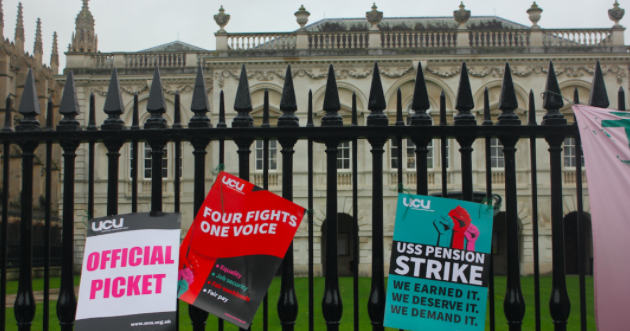
Cambridge saved over £240,000 in pay deductions during 2019-20 strikes
The deducted pay was split between student hardship funds, a pilot eating disorder clinic, and the Childcare Bursary Scheme
Cambridge saved a total of £246,464 in pay deductions during the 2019-20 strikes, an FOI (Freedom of Information) request sent by The Tab has shown.
The money saved will be divided between the Childcare Bursary Scheme, the Special Hardship Fund, which is available to students facing unforeseen financial hardship due to the strikes and COVID-19, and a three year pilot eating disorder clinic, a scheme “supported by students”.
The first set of strikes, which took place between 25th November and 4th December 2019, stemmed from the UCU (University and College Union) voting in favour of industrial action on the basis of USS Pensions and Pay and Equality. Academics were set to lose out on £240,000 each on average as a result of the pension changes and the pay of academic staff, having seen a 20 per cent drop in pay in real terms over the last 10 years. The demands of the strikes were for a return to pre-strike levels of pension contribution, and for pay offers above inflation. The staff at “pre-92 Universities” – institutions that were part of the University sector prior to 1992 – have been forced to make higher contributions to USS pensions, resulting in greater pay cuts. Across the country, over 40,000 university staff at 60 universities were striking as well.
A further round of strikes took place from 20th February to 13th March, with the same demands in place. Students were encouraged to email the Vice-Chancellor, Stephen Toope, to tell him that they supported the strikes, whilst University libraries were off-limits.
The Tab Cambridge contacted the University for comment on the information given as a response to our enquiry, and a spokesperson said: “The University of Cambridge greatly appreciates the incredible hard work that all union and non-union assistant, professional, academic and research staff have put into ensuring the safe operation of the University during the Coronavirus public health emergency and acknowledges that staff members who do not go on strike, do not take that decision lightly.”

Credit: Giulia Armiero

Credit: Esme Cavendish
When asked for a comment on the University’s decision to channel savings into these schemes, Jo Grady, general secretary of UCU, said: “Students understand that the working conditions of staff are their learning conditions, and the support they offered UCU members during the strikes was phenomenal. We made clear from the outset that the strikes were only necessary because of universities’ refusal to negotiate properly with us on key issues around working conditions, pay and pensions. We have been clear that every penny of money saved by universities through pay deducted from striking staff should be spent on student initiatives such as hardship funds.”
“It’s really encouraging that the University have decided to spend the money on student charities,” one student told The Tab Cambridge. “Lots of people were affected by the strikes and so it’s a good idea that the money should go towards students who were especially negatively affected by the strikes.”
Featured image credit: The Tab Cambridge









































